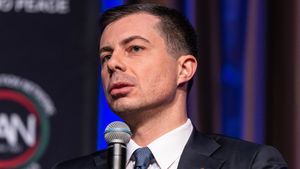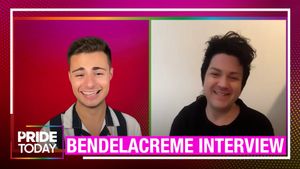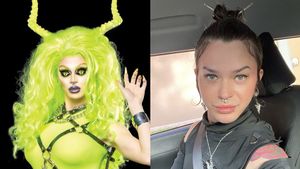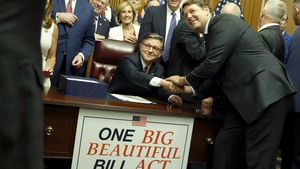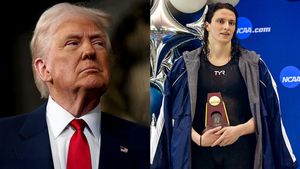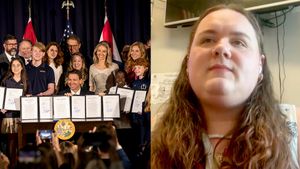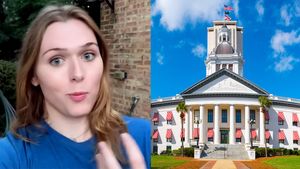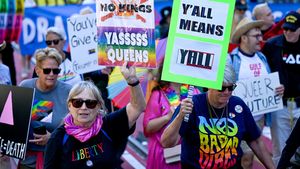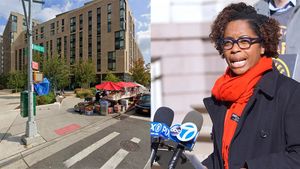Walking through the teeming, sprawling hallways of BuzzFeed HQ on 18th Street in Manhattan, I run into editor-in-chief Ben Smith. When Smith learns I'm here to interview Saeed Jones--co-host of their morning show AM to DM and a mainstay on the site for the past five years, including a stint as LGBT culture editor--he claims that once he's old and retired, Saeed will be the one person or achievement he will get asked about.
"He said that?!" Jones asks later after I relate the anecdote. "On the record?!"
It's not too surprising. An accomplished poet, Jones's debut collection, Prelude to Bruise, accumulated several accolades and was named a finalist for the 2015 National Book Critics Circle Award; his forthcoming memoir, How We Fight for Our Lives, will be published by Simon & Schuster next fall. But his main focus these days is AM to DM, where every weekday at 10 am, he and straight BFF/BuzzFeed founding books editor Isaac Fitzgerald take to the Twitter for the latest, breaking news.
A morning show on Twitter--the digital cesspool where opinions go to die, only to mutate then battle it out until something flashier comes along--sounds like a gamble, but it's a gamble that seems to be paying off. During its first week, AM to DM averaged one million total unique viewers each day, with clips from the show viewed some 10 million times on Twitter.
"Media is tough. Journalism is tough. Journalism in America in 2017 with President Trump is tough," Jones says, but AM to DM is trying to rise to the challenge. And Jones feels uniquely qualified to do so. "When you talk about queer people in media and representation and everything, a lot of it is about people being risk averse," he says. "It's editors and gatekeepers being scared to trust that people who don't look like them, live like them, love like them can run shit. When you feel that work or media is being made for you or with you in mind, you want to engage it."
He adds, "As a gay black man from the South, I went so many years without engaging so many aspects of media because I didn't think there was a place for me there. I once felt that way about news organizations: Y'all don't write about black gay men unless we're dead, unless we're being attacked, or unless it's about HIV/AIDS. Even when it is about HIV/AIDS, I don't think the reporting is where it needs to be. So why am I going to engage you?"
However, his experience at BuzzFeed and with AM to DM has given him the opportunity to change his mind. "I never imagined that I could be myself ," he says, "and that who I am in relation to one of my best friends, Isaac, is a feature not a bug."
Here, we chat with Saeed about taming the news cycle beast and the benefits of Twitter, aside from shady memes and even shadier presidential missives.
How does AM to DM fit into the media landscape of 2017?
I've been thinking a lot about clarity. Everyone's relationship to news has changed. I think that a lot of people feel overwhelmed by news; there's too much now it seems and it's too fast. We need to get people the information they need, but also clear the timeline--don't ignore the hoaxes, don't ignore the misinformation; shine a light on it and provide clarity. I think there was a time when news institutions might have tried to pretend that birtherism wasn't happening. But when you're pretending on your show or newsroom that something isn't happening that doesn't mean it's going away.
Having one of our science reporters on to talk about a fake scientific study about climate change and show the way misinformation travels, just on one article, is important. It's important to begin to provide clarity for that aspect of news and culture because it is real, it is rampant, and it has consequences. And I think that is a big part of the mission of the show. But also to do it in a way that's...I want you to feel that Isaac and I are kind of looking you in the eyes and that we're having a conversation and that you can be heard; you can tweet us, as people do, and it's really exciting, and we'll try to integrate your questions and your feedback into the conversation. That's new and special.
Twitter isn't known for its attention span, and after a big news event, there's always a massive, contentious tweetstorm. Choosing Twitter, then, is an interesting choice for a morning show, considering how toxic it can be. How do you feel about that?
Well, I feel all kinds of ways. [Laughs] One thing I can say is, anything can be toxic, unfortunately. Yes, Twitter can be toxic, and that's why the clarity is important. One of my dreams for the show, if we get really good, is to be useful. Something I like about Twitter is that it's a meritocracy. People engage or retweet if it's useful to them--whether it makes them feel good, or it's an interesting point, or an interesting meme. I think if the show is really good, my hope is that we can get to the point where people who "can't do Twitter" will watch AM to DM because it curates it for them: organizes all of that information and humor and entertainment and culture in a way that works for them. I think that would be thrilling.
It's funny, and it's blowing my mind, that my cousin and my aunties watch the show. Like, I didn't even know they were on Twitter! [Laughs] Both sides of my family are originally from Memphis and I grew up very aware that I wanted to get to New York City. I knew from the time that I was very young that I wanted to get to the Emerald City and be my full self once I was there. And I have, which is incredible and exciting, but you should not have to get to New York City, or Los Angeles, or London to be a part of the conversation. So it's really exciting for me to see my family members and people I grew up with and went to school with in Lewisville, Texas, that I haven't talked to in a long time, engaging the show. I think a lot of us growing up didn't feel like there was even an option of having our voice heard, or if we spoke up we would be shut down in some way or have our words twisted. I know it's a subtle, small thing, but I do think there is something deeply powerful about a teacher on the other side of the country tweeting us during the show, "Oh this is interesting, I wanna talk about this with my students," and Isaac and I being able to say that out loud on the show. When people think about the news in America in 2017, they're not thinking, "Lotta friendship there!" or that news is fun--but I think it can be.
It's possible--we know as queer people--to be many things at once and it's absolutely possible for a morning show to light up all of those facets of your life. You can laugh, you can be informed, you can be surprised and challenged.
What does it mean for you to be a queer person in America right now?
I feel I have no option but to be my absolute self. I have to open up all of the doors in myself now. I think we all do. We cannot afford to hold back or to make decisions rooted in fear. I've got to be myself, I've got to access all the potential that I have that I can access because I think I am needed. I think we all are. And I think America's life may well depend on it, on all of us feeling--as citizens, as people, queer, queer people of color--that America needs us.








